Most organizations, especially startups and small businesses, take the cost of an LMS software as a huge deciding factor in adopting one. You could be looking for free software, a pay-per-user solution, or an enterprise-grade platform, but whatever price point you want, it’s important to get a clear picture first of what these vendors offer and how they stack up against each other, especially in these tough times when the COVID-19 pandemic is causing a lot of rethinking over how organizations should approach their spending.
In this article, we’ll walk you through a detailed pricing analysis and comparison of LMS solutions. This guide should be able to help you pinpoint which LMS software would give you the most value for your money while delivering the most important features—the creation of learning content, knowledgebase, learning portals, course management, mobile accessibility, scalability, and more.

How much does LMS software cost?
Investing in LMS software
The Coronavirus outbreak shut schools and forced businesses to shift their operations, communication, and training online. Though there are industries that took a hard blow from the virus, the LMS sector experienced high demand since companies and schools had to find a solution to how they can continue teaching and collaborating while working from home.
Because business size and requirements are diverse and the training process dynamic and continuing, the learning management system does not come as a “one-size-fits-all” solution. Those who think of it as such end up disappointed. In fact, 44% of organizations were found to be unhappy with their current LMS, and 24% reported a dislike of LMS tools that have limited or no mobile capabilities.
Matching LMS software to your organization’s needs is crucial and likewise difficult because the features and capabilities that you’re looking for come at a price. Even free LMS solutions will eventually cost you something down the line, such as lost opportunities or potential revenues because of inherent limitations. But for this article on how much does LMS software cost, we’ll focus on premium solutions.
For both small and large businesses (the former with budgetary constraints and the latter with adequate resources), the question that levels the LMS equation is—is it worth it? The answer is yes. In fact, employers recognize the positive impact of ongoing education and reward their employees accordingly.
Positive implications of ongoing education for companies and employees according to employers
Source: Docebo
Designed byLMS software provides benefits worth your investment, including a knowledgeable and engaged workforce, improved productivity, savings in time and resources, and lower training costs. Before we tackle our LMS pricing comparison, let’s first understand how vendors price their LMS products.
Understanding LMS Pricing
The question of how much does learning management tools cost depends on a lot of factors, and it is important that you learn prevalent LMS pricing strategies. Here are two general types of LMS deployment and their pricing models.
On-Premise. The software is self-hosted on the company’s server or on third-party servers and, thus, allows for more customization, scalability, and integration with other locally hosted apps. These benefits naturally translate to a more expensive system. Cost estimates for self-hosted LMS cover:
- Perpetual License – a one-time upfront cost that can range from less than $500 to more $20,000.
- Setup Fee – charge for installing an LMS that can run over $25,000.
On-Cloud. It may come in the form of SaaS hosted on the vendor’s server or directly hosted on the Internet, both of which are offered online and accessed through browsers from any connected device. These are the most popular, low-cost solutions today. Plans and prices can be:
- Pay-Per-Course – learner pays for the course or courses enrolled
- Pay-Per-Use – can range from less than $1 up to $10 per learner per course
- Pay-Per-User/Learner – a flat fee per learner that cost around $5 per month or even less if there are many company enrollees
- License Fee – one-time fee to access the LMS for a set period of time (ex. per month or for a whole year)
- Setup Fee – more or less around the $5,000 range
Take note that LMS providers sometimes mix the above pricing models, such as pay-per-use, per-course, or pay-per-user-per-module. It is important that you clear with the vendor what the word “use” applies or covers in their terms and conditions. Another thing, setup fees are normally one-off payments that may include branding, staff training, and customer support, among others
As you can see, the variety of pricing plans and models available make it necessary for you to seriously study your options. Before you commit to any LMS solution, it is crucial that you take into account the frequency and length of time you’ll be using it as well as the number of users.
What hidden costs should you consider when choosing LMS software?
While the initial pricing of LMS software is often transparent, hidden costs can arise throughout the implementation and operational phases. Here are some of the common hidden expenses to be aware of when choosing an LMS:
- Implementation and Customization Fees
Beyond standard setup fees, additional customization costs may apply if you require specific branding, integration with other systems, or advanced features. These customization expenses can increase significantly based on the complexity of your requirements. - User Training and Support
Training employees to use the LMS may require additional time and resources, especially for complex platforms. Many vendors offer training packages at an extra cost, so it’s essential to factor these into your budget. Additionally, while basic support is often included, premium support or extended service hours may come at an extra cost. - Content Creation and Updates
If your LMS doesn’t come with built-in content creation tools, you may need to invest in third-party authoring software or hire content developers. Similarly, regularly updating content to keep it relevant may incur ongoing costs. - Third-Party Integrations
Integrating your LMS with other tools, such as HR or CRM systems, often incurs additional charges. Check if these integrations are covered in your plan or if they require separate licenses or setup fees. - Data Storage and Bandwidth Costs
LMS platforms hosted in the cloud may charge extra for data storage beyond a specified limit or for higher bandwidth usage, especially if you’re storing video-heavy content.
To further guide you, we’ve come up with this LMS pricing comparison categorized into small business solutions and enterprise platforms, so you can narrow down your choices depending on the size of your business and the potential number of learners.
How Much Does LMS Software Cost?
Small Business
For small and starting businesses, how much does LMS software cost is a decisive question. Many will opt for free LMS solutions. However, unlocking the full functionalities and capabilities of LMS software is only possible with premium offerings. Below are some of the leading small business LMS software that you can consider.
1. TalentLMS

TalentLMS is a fully customizable cloud LMS designed to help you train your employees, partners, customers, or students. It allows you to quickly build elearning courses, configure and personalize course with our branding or specific requirements, apply simple and comprehensible analytics to get insights from your learning environment, and get comprehensive support for SCORM & TinCan (xAPI), notifications, course selling, video-conferencing, and gamification, among other features.
The vendor offers a free plan inclusive of basic functionalities if you want to have a better grasp of what it has to offer.
TalentLMS covers all the essentials that you expect from an elearning solution such as creating, cataloging, and managing courses; assessment and grading tools; extensive reporting on test results; communication tools; certifications and compliance; integration with 200 apps and services; and security mechanisms and protocols.
Aside from a free plan, the software is offered in four premium plans, with two of them—starter and basic editions—priced from $59/month to $129/month.
Detailed TalentLMS Review
Pricing and features
- Starter and Basic plans go for $59/month and $129/month, respectively
- 40 to 100 users
- Unlimited courses
- Unlimited email support
- Monthly or annual subscription
- Free support
2. Absorb LMS
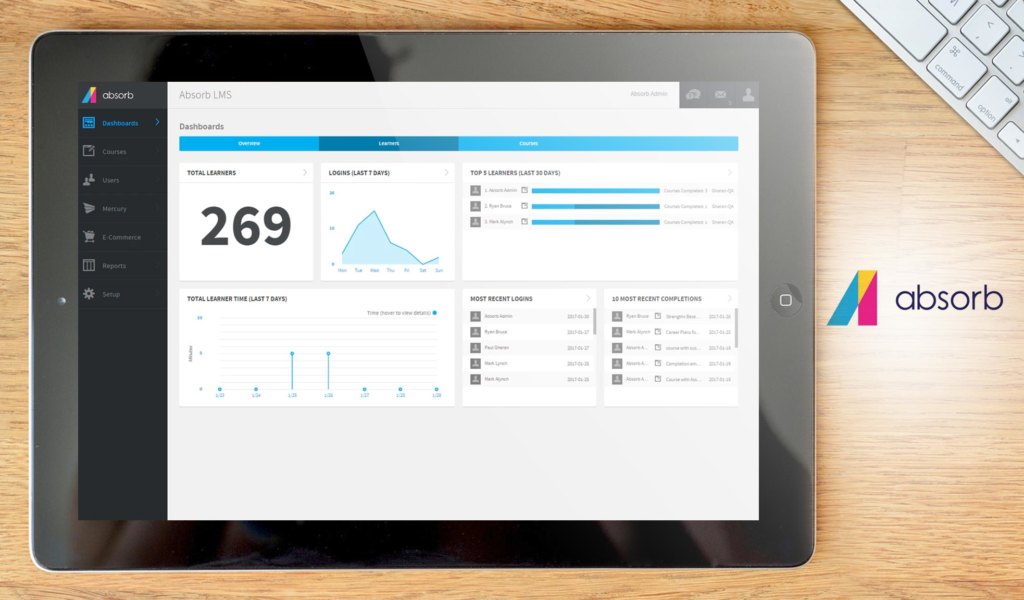
Absorb LMS is an award-winning LMS platform built for training employees, customers, and global channel partners. It uses forward-thinking technology to provide an efficient learning experience. It has an accessible and intuitive user interface, which provides learners with a conducive training environment.
One of the key features of Absorb LMS is its public dashboard. It acts like a CMS where you can create training content, FAQs, featured courses, and news articles. Plus, you can use this public dashboard as a storefront to offer and sell your online courses.
Absorb LMS is highly customizable as well. Using its customization tools, you can create a learner-base that lets you communicate with learners in a style that matches your brand. You get total control over the color, fonts, and layout that you want for your learning portal. The platform also supports over 25 languages, allowing you to manage a global learner-base.
Detailed Absorb LMS Review
Pricing and features
- Quote-based
- Automated workflows
- Ecommerce module
- Content libraries
- Mobile learning
- Gamifications
3. iSpring Learn LMS
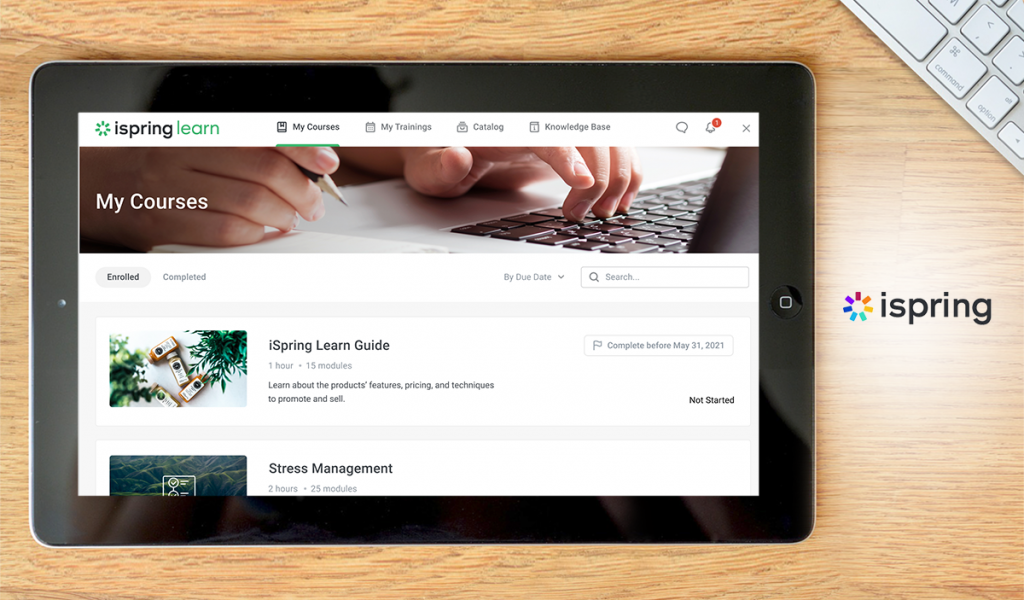
iSpring Learn is an award-winning LMS software that offers content management tools, unlimited content storage, and user management. Perfect for organizations of any size, it’s the perfect tool for onboarding new hires, product training, sales training, channel training, and compliance training.
With this tool, you can build your own learning management portal and customize it into any style that matches your brand.
At a fair price, you get all the essential training management tools–you can manage training deadlines, send invites and reminders, and generate detailed reports of your team’s learning progress. Also, it automatically provides completion certificates for trainees who have finished the online exams, interactive training scenarios, and self-assessments.
The pricing plans range from $2.82 to $3.66/user/month billed annually.
Detailed iSpring LMS Review
Pricing and features
- $2.82/user/month (500 users) to $3.66/user/month (100 users) billed annually
- Courses
- Authoring tools
- Technical support
- Single sign-on
4. Litmos
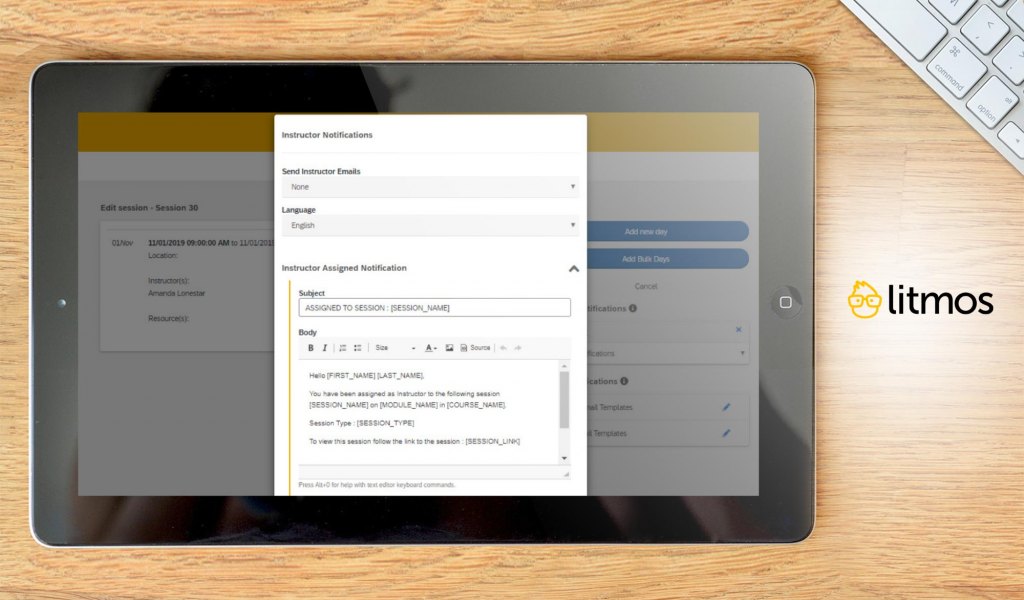
Litmos is a flexible learning platform (LMS) that supports training across the extended enterprise. With swift deployment and easy integration through 30+ connectors or custom APIs, Litmos caters to diverse organizational needs. Prioritizing security and compliance, the platform encrypts data, ensuring GDPR compliance, and offers ready-to-access courses in various domains. Litmos emphasizes accessibility, enabling 24/7 training from any location, online or offline, with support for over 35 languages to eliminate language barriers.
Powerful and flexible, Litmos allows organizations to measure and influence performance through built-in reporting and analytics. It tracks metrics like course completions, test averages, and content popularity. The platform also enables the creation of dynamic SCORM content internally.
Detailed Litmos Review
Pricing and features
- Quote-based plans
- Training content
- Course creation
- Reporting and tracking
- Content collection and services
5. Canvas LMS

Canvas LMS is a popular online learning platform geared towards educational institutions. It provides a customizable learning environment and design, which allows you to educate as you envision, and your students to learn the way they want. Simplified communication is facilitated between teacher and learner, ensuring that both can smoothly collaborate on the learning process.
The system is designed to help you craft learning tools for your students. You can provide feedback, combine videos, blogs, wikis, and other channels of education while tracking your students’ progress.
On the other hand, Canvas LMS lets students obtain notifications, submit paperwork, and interact with the learning materials given to them on the machines they use. They can also integrate their Canvas LMS account with their social media such as Facebook and Twitter. Pricing for the software is quote-based, depending on the number of users, training, support, and other requirements of the institution.
Detailed Canvas LMS Review
Pricing and features
- Pricing by quote
- One-time setup fee
- Annual subscription
- Collaborative workspaces
- Web conferencing tools
- Supports external integration like Facebook and Google
- Integrated media reporting
6. Trakstar Learn
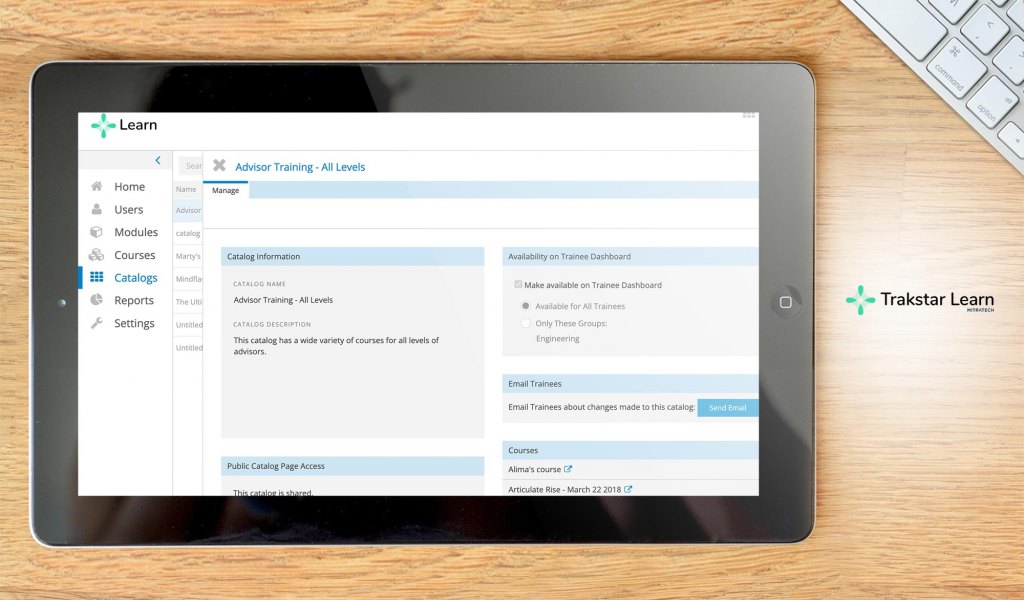
Trakstar Learn, previously called Mindflash, is a cloud-based LMS solution for corporate training. It is designed to assist HR leaders in developing comprehensive training systems, learning paths, onboarding programs, and upskilling content. It’s a trusted solution used by over 1,000 businesses across 177 countries. The platform prides itself on its innovative features and emphasis on user experience, making it possible to create training courses quickly and efficiently.
The platform’s focus extends beyond just the content it provides, placing significant importance on the overall user experience. It offers an intuitive online training platform that successfully addresses training challenges and provides reliable solutions for large companies globally. Its mobile-friendly nature makes it a valuable tool for companies seeking extended enterprise training. For rapidly expanding companies, Trakstar Learn’s expertise can be leveraged to deliver training on a wide range of topics. The platform is offered via quote-based plans.
Detailed Trakstar Learn Review
Pricing and features
- Quote-based pricing plans
- Online course creation
- Learning management
- Quizzes and assessments
- Reports and dashboard
- SCORM compliant
- Auto Enrollment
- Upskilling
- Onboarding automation
- Virtual Classroom
Enterprise
Large companies account for more than 30% of LMS buyers and often are often the first to jump on the bandwagon when it comes to following elearning trends. However, having enough resources doesn’t mean they get the best software. It all boils down to having the right software that addresses the company’s requirements. Here some of the top enterprise-level LMS solutions today.
1. Coassemble

Coassemble is an all-in-one online training software that combines LMS and content creation. It has an intuitive interface that allows you to manage all your training programs with ease. It also offers mobile-responsive templates, learning pathways, and URL, and SCORM reporting.
As a cloud-based platform, Coassemble hosts your course materials in one robust infrastructure. With its unlimited storage, you can build as many training programs as you need. Its centralized resource library also allows you to consolidate your training resources under a single hub.
Coassemble provides over 40 drag-and-drop authoring templates that you can use in building your course content. These templates are mobile-optimized, allowing your learners to access your training materials from any location and any device.
The software offers a Pro plan priced at $499/month.
Detailed Coassemble Review
Pricing and features
- $499/month
- 250 monthly active users
- Advanced course settings
- Advanced workspace settings
- Advanced reporting
- Advanced permissions
- Unlimited storage
- Zapier integrations
- Custom branding
2. eFront
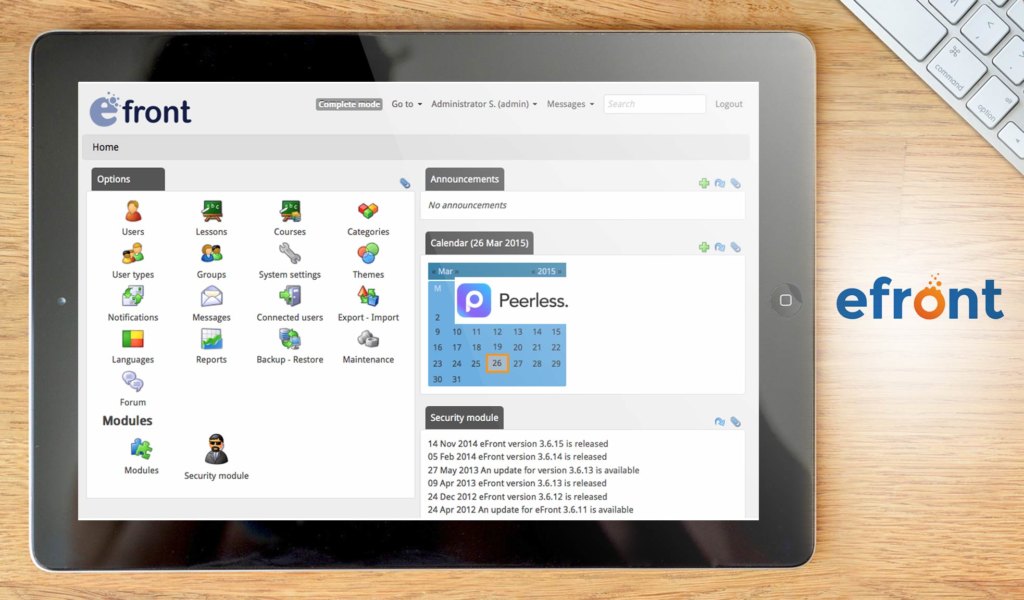
eFront is a fully adaptable LMS solution that scales to fit your needs. It offers enterprise-grade deployment options – via cloud or on-premise – and an extensive set of customization features that you can adapt to your portal’s look and structure as well as integrate your training into your enterprise environment seamlessly and efficiently.
It offers several security filters and administrative tools to safeguard your training data, is mobile optimized and ecommerce ready, and brings API and over 32 native integrations.
eFront comes complete with all advanced LMS features, including administrator and learner tools, course management, ecommerce, customizations, and access to the software’s source code. Four tiered pricing plans are offered on pay-per-user basis.
Detailed eFront Review
Pricing and features
- $1000 to $2500 per month for 1,000 to 5,000 users
- Custom pricing for more than 5,000 users
- Unlimited bandwidth
- Pre-defined storage amount
- Fully managed portal
- Private cloud network, backups, security and system updates
3. Docebo
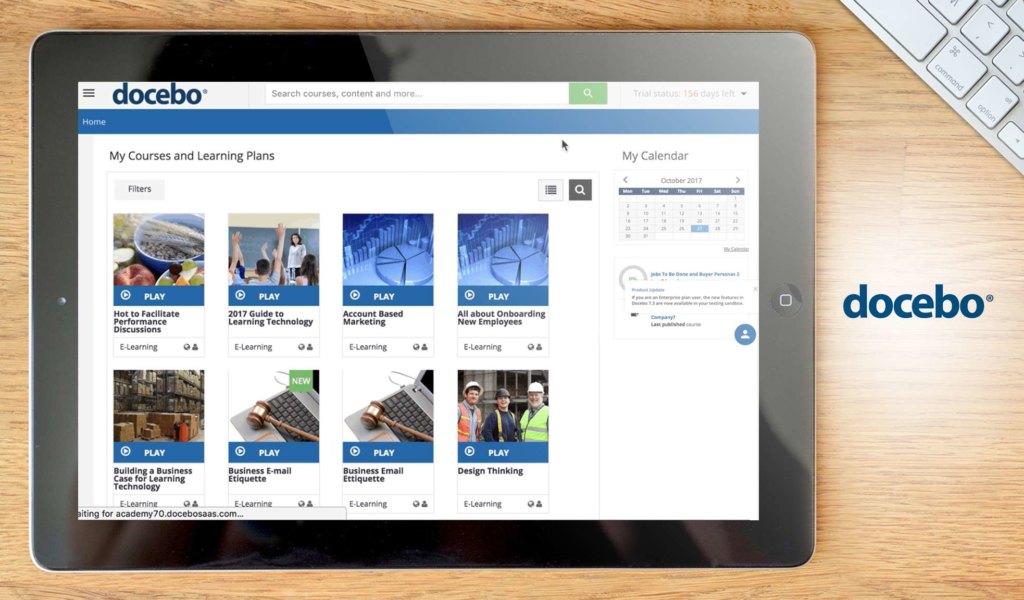
Docebo is an easy to use cloud LMS built to help you organize, track, and distribute online courses for formal learning of your employees, partners, and customers. It allows your employees to ask questions and get answers from subject matter experts within your organization as well as capture user-generated knowledge, validate it through peer-review, and share it across teams.
You’ll be able to identify your organization’s skills and competency gaps and close them by assigning formal and informal learning interventions with Docebo’s skills management system.
With Docebo, you can easily upload and share your training materials like PPT, PDF, SCORM, Tin Can, and Video files. Its course tracking features, together with a rich set of default and custom reports, enable you to efficiently and conveniently monitor and track the training performance of your workforce.
All two of Docebo’s pricing plans—Growth and Enterprise – are available by quote.
Detailed Docebo Review
Pricing and features
- Custom pricing
- Up to 300 or custom number of users
- Unlimited storage
- Unlimited courses
- Unlimited admins
- Unlimited bandwidth
4. LearnUpon
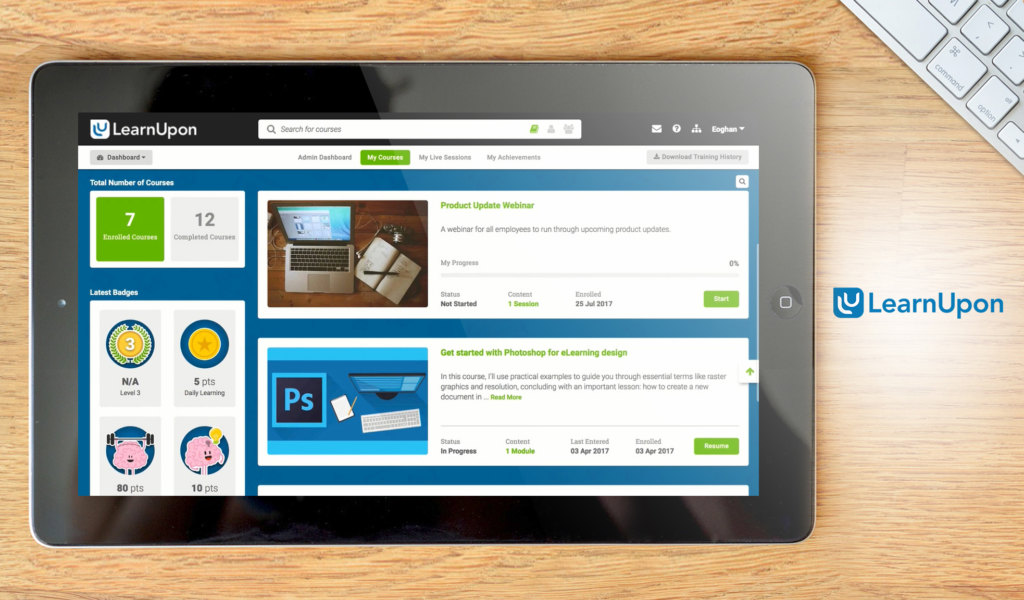
LearnUpon is a learning management system that allows you to train your employees, customers, and partners from a single platform. It lets you deliver simple, impactful, and accessible training courses in easy-to-use learning portals. Using the drag-and-drop function, you can easily create, modify, and upload your online courses.
The software can be integrated with popular webinar tools, such as Zoom, GoToWebinar, and AdobeConnect. Moreover, it allows you to facilitate instructor-led training and manage live training sessions.
The vendor offers Basic, Essential, Premium, and Enterprise pricing plans, ranging from $599/month to $1699/month.
Detailed LearnUpon Review
Pricing and features
- $599 to $1699 per month for 50 to 500 active users
- Enterprise Plan is available by-quote
- Custom branding
- 24/7 support
- Reporting
- Customer success
5. SkyPrep
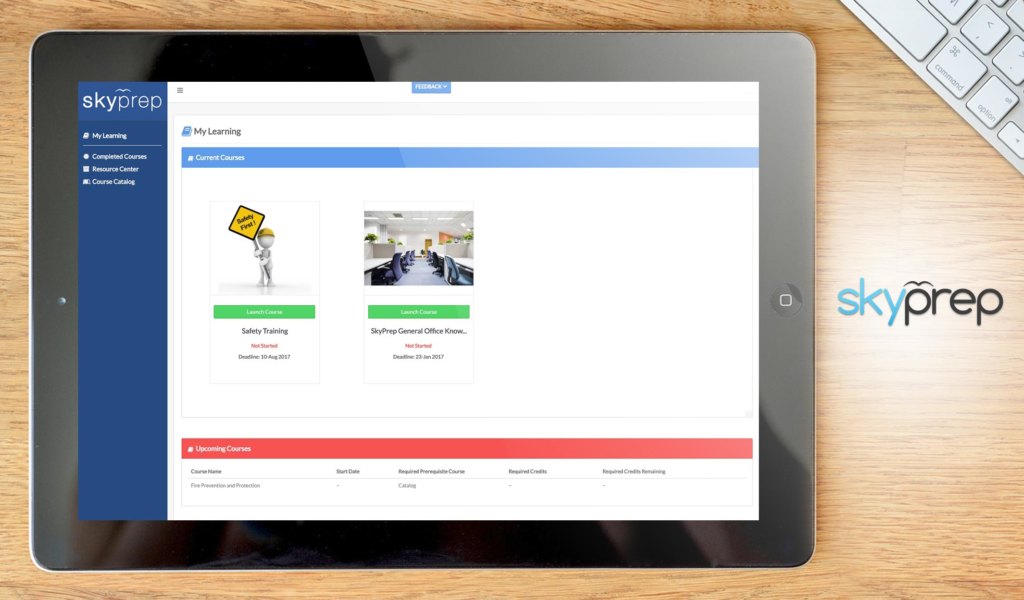
SkyPrep tools simplify onboarding and training needs. All its features are scalable, and it can seamlessly handle the needs, concerns, and requirements of enterprise-level businesses. Its course-builder allows for almost all kinds of files, making it easier for instructors to tailor-fit lessons for training and onboarding. Its advanced reporting tools can instantly record and evaluate the performance and progress of all participants. User management will never be a concern for it has a built-in calendar that sends timely notifications for due dates, quizzes, exams, and webinars.
SkyPrep has rich content management options that allow for the continuous reuse of content. Users have the option to create their content directly in-app or through third-party software. Courses can be easily linked to create solid and automated training and onboarding experience. For evaluation, users can make use of quizzes, exams, and surveys. Grading is automated with instantly accessible results and progress reports.
It’s ideal for enterprises that target quantifiable manpower development as it has robust reporting tools that deliver multi-level analytics. Together with automatic assessment and feedback, delivered visual reports include user performance and course performance profiles.
SkyPrep billing is cost-efficient as pricing is based on the number of active users. Unlimited courses can be uploaded with no additional charge.
You can also check out this SkyPrep price and cost analysis.
Detailed SkyPrep Review
Pricing and features
- $349 to $749 per month for 100 to 500 users
- Enterprise Plan is available by-quote
- Multi-Year Discounts
- Unlimited Registered Users
- Unlimited Courses, Assessments, and Content
- Email Support
- Phone Support
- Advanced Security Controls
- Manager Roles
- Multi-Platform Hierarchy
- Advanced Reporting
- Open API
6. Bridge LMS
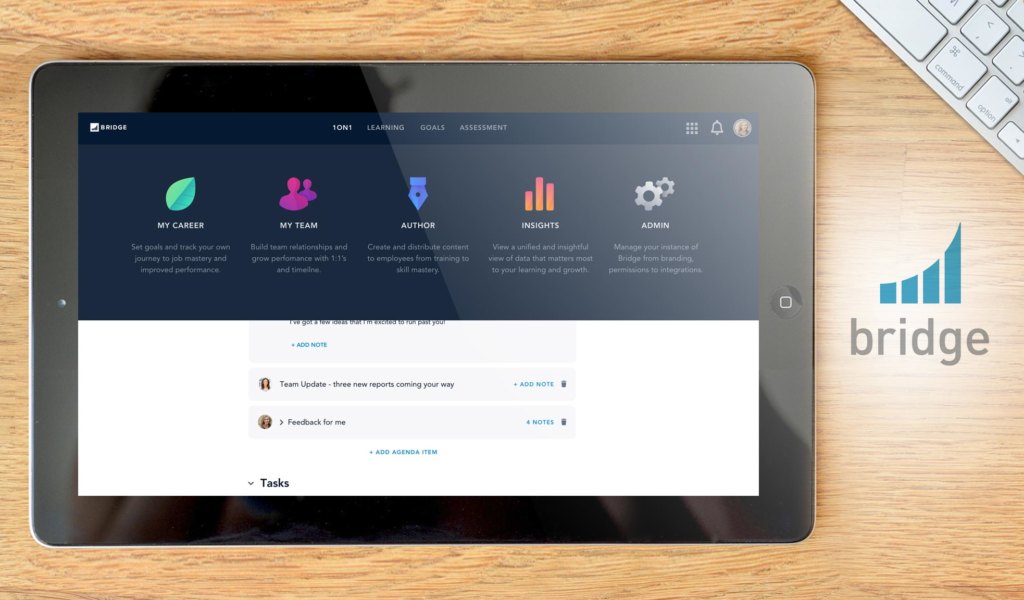
Bridge LMS is an end-to-end solution designed for effective employee development. It covers employee engagement, career development, performance enablement, learning management, and peer-to-peer connection, allowing you to manage employee development in every aspect. It has tools for content creation, goal setting, and development planning that allow you to align your employees’ skills with your organizational goals.
The software helps you to build a customized and engaging course content using an intuitive course authoring tool. To save time and resources, however, Bridge LMS has an on-demand content library that you can use.
Other helpful features include peer-to-peer feedback and file-sharing tools. These allow your participants to collaborate on group tasks during their training period. Learner assessment tools are also handy in monitoring your employees’ training performance for each course.
The product is only available by quote.
Detailed Bridge LMS Review
Pricing and features
- Pricing by quote
- Manager Dashboard
- Central index
- Multi-language support
- Enrollment overview
- User activity
- Learner directory
- Roles and permissions
Which LMS is Ideal for Your Budget?
As the world continues to grapple with COVID-19, more organizations and learning institutions will also look into the best LMS for their needs. Regardless if you go for a small business LMS solution or a full-fledged enterprise LMS software, keep in mind that a good LMS should be user-friendly, applicable for your type of business or organization, and provides value for money.
Often, when looking for LMS software, you’ll only see the upfront cost. It is important that you contact the vendor and have all the fees and prices that you’ll encounter for your particular situation laid down on the table. In that way, the answer to the question of how much does LMS software cost will be fully transparent to you, devoid of surprises or hidden fees.
If you are still unsure of which one to choose for your company, we highly recommend TalentLMS. While it is designed for small- and medium-sized businesses, it can scale up to the needs of larger companies. What’s more, it offers intuitive LMS features that are highly flexible, allowing you to set up your learning programs however you prefer. Simply sign up for the free TalentLMS app.
You can also check out our list of the best LMS solutions.
Key Insights
- Cost Variability: LMS software costs can range from free to thousands of dollars depending on the deployment type and features.
- Types of Deployment: There are two main types of LMS deployment—On-Premise and On-Cloud—with On-Premise being more expensive due to customization and scalability options.
- Pricing Models: Common pricing models include Perpetual License, Pay-Per-Course, Pay-Per-Use, Pay-Per-User, and License Fee, with setup fees often being additional.
- Importance of Matching Needs: Selecting the right LMS involves matching its features and capabilities to the specific needs of your organization.
- Impact of LMS: Investing in LMS can lead to a knowledgeable and engaged workforce, improved productivity, and reduced training costs.
- Free vs. Premium: While free LMS solutions exist, premium offerings provide full functionalities and capabilities that are often necessary for comprehensive training programs.
- Small Business Options: Leading LMS options for small businesses include TalentLMS, Absorb LMS, iSpring Learn LMS, Litmos, Canvas LMS, and Trakstar Learn.
- Enterprise Solutions: Top enterprise-level LMS solutions include Coassemble, eFront, Docebo, LearnUpon, SkyPrep, and Bridge LMS.
FAQ
- How much does LMS software cost? LMS software costs vary widely, from free options to thousands of dollars. The exact cost depends on factors such as deployment type (On-Premise or On-Cloud) and the chosen pricing model (e.g., Perpetual License, Pay-Per-User, etc.).
- What factors influence the cost of LMS software? The cost of LMS software is influenced by deployment type, number of users, features and capabilities, setup fees, and ongoing subscription or license fees. Additional costs can include customization, integration with other systems, and customer support.
- What are the typical pricing models for LMS software? Common pricing models for LMS software include several options. The Perpetual License model involves a one-time upfront cost, while the Pay-Per-Course model charges based on the courses enrolled. The Pay-Per-Use model incurs costs per user per course, and the Pay-Per-User model charges a flat fee per learner per month. Lastly, the License Fee model requires a fee for a set period, which can be either monthly or yearly.
- What are the benefits of investing in LMS software? Investing in LMS software can lead to a knowledgeable and engaged workforce, improved productivity, savings in time and resources, and lower training costs. It also facilitates ongoing education and professional development.
- Are there free LMS options available? Yes, there are free LMS options available, but they may come with limitations in terms of functionalities and capabilities. Premium LMS solutions offer more comprehensive features that can better meet the needs of businesses and organizations.
- How do I choose the right LMS for my organization? To choose the right LMS, consider your organization’s size, budget, specific training needs, and the features and capabilities you require. It’s also important to evaluate the total cost of ownership, including any setup fees and ongoing expenses.
- What are some recommended LMS options for small businesses? Recommended LMS options for small businesses include TalentLMS, Absorb LMS, iSpring Learn LMS, Litmos, Canvas LMS, and Trakstar Learn. These platforms offer a range of features and pricing plans suitable for smaller organizations.
- What are some top LMS solutions for enterprise-level organizations? Top LMS solutions for enterprise-level organizations include Coassemble, eFront, Docebo, LearnUpon, SkyPrep, and Bridge LMS. These platforms offer advanced features, scalability, and customization options to meet the needs of larger businesses.



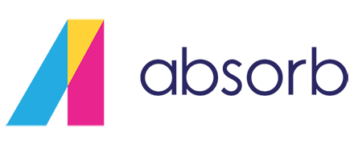
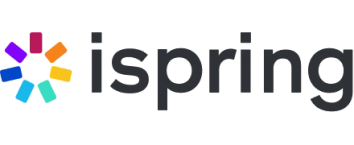
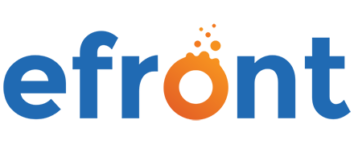



























Leave a comment!